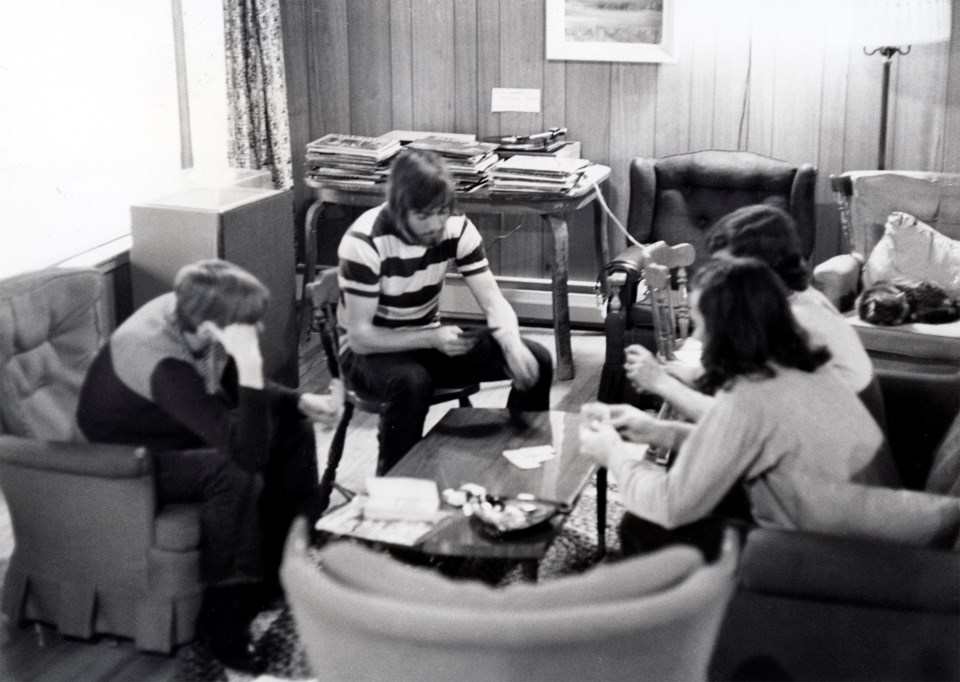Before lifts were built and the area became known for its snow and skiing, tourism in the valley focused on the lakes and the summer months. Though various cabins from the 1920s to the 1950s can still be seen amidst much more modern homes on the shores of Alta Lake, many of the buildings from this period are gone today due to various fires and redevelopment. Some buildings, however, managed to make the transition to year-round use, and can still be found today.
Dick Fairhurst began operating Cypress Lodge on Cypress Point in 1954. It started with a few cabins built by Dick and three pre-existing cabins and a tearoom from Harrop’s Point. Dick, his mother Elizabeth, and later his wife Kelly continued to add to and renovate the property into the 1960s. Construction began on the main lodge building in February, 1963, and was completed for the 1965 May long weekend. Though Cypress Lodge was built with summers in mind, the Fairhursts were quickly able to expand their business to include winter ski seasons. Often the cabins on the property were rented out year-round to people working in the valley. The lodge building was filled with work crews for BC Highways in summer and with skiers in winter.
In 1972, the Fairhursts sold Cypress Lodge to the Canadian Youth Hostel Association (now known as Hostelling International Canada, or HI-Canada) for $140,000. The sale included all nine buildings on the site, including the main lodge, the cabins, and the Fairhurst’s family home on the upper portion of the property.
The property was officially reopened as a hostel in July 1973. It aimed to provide affordable accommodation to individuals and groups of travellers throughout the year. In 1973, it could accommodate 21 guests and cost only $3/person, including breakfast. Over time, the hostel increased its capacity and provided housing for its staff and long-term tenants.
At a museum event in the 1990s, Alex Kleinman remembered his days managing the hostel in the early 1970s. Because the hostel had hot running water, he would often trade showers and a warm place to hang out in exchange for chopping firewood and making small repairs to the property from some of the people squatting nearby. When three people living in a geometric dome by the side of Scotia Creek appeared at 3 a.m. one morning because a bear had walked through the tarp walls of their home, he provided them with a place to stay.
At about 11:30 p.m. on Dec. 26, 1994, one of the small, two-bedroom cabins near the lodge caught fire, according to reports in the Whistler Question and Pique Newsmagazine. Luckily, there was no one in the cabin at the time, as it was quickly engulfed by flames. The hostel staff evacuated the guests from the lodge, and guests and staff began shovelling snow against the lodge and wetting it with a garden hose to prevent the fire from spreading. Despite their efforts, when the Whistler Fire Department arrived the fire had spread to the lodge roof. The firefighters were able to extinguish the fire, but not before it had travelled through the attic bedrooms and down some of the rafters. The lodge escaped with only some charring and water damage while the small cabin was destroyed.
Alternative accommodations had to be found for the hostel guests during one of the resort’s busiest weeks of the year. The Delta Whistler Resort provided five free rooms, and other hostel guests were put up by neighbours and Greg Warham, the manager of the hostel. One local resident even offered up a five-bedroom house for the guests scheduled to arrive the following week.
The hostel continued to operate out of the Cypress Lodge property until July 1, 2010. Before it closed, the hostel had a capacity of 28 guests and eight staff members. That same month, HI-Canada opened its current location in Cheakamus Crossing with a capacity of 188 and a staff of 20. The property on Alta Lake was purchased by the Resort Municipality of Whistler, and continues to be used today as the Point Artist-Run Centre and the Whistler Sailing Association.




